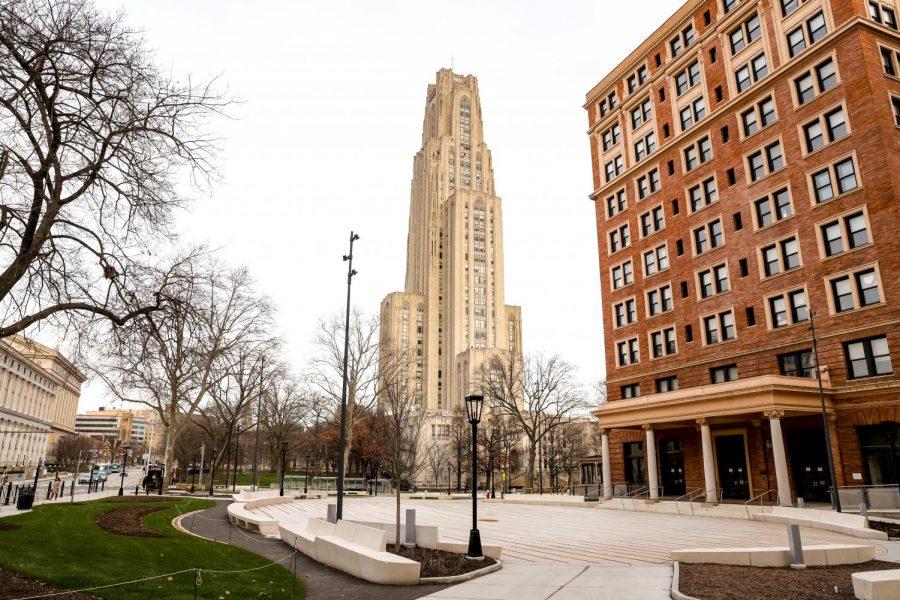Pitt students petition for hybrid classes
Kaycee Orwig | Senior Staff Photographer
The Cathedral of Learning and William Pitt Union.
February 2, 2022
A petition asking Pitt to allow a hybrid learning option this spring has amassed nearly 2,000 signatures since an unnamed student created it three weeks ago.
The petition, directed to Dean of Students Carla Panzella, mentioned the large number of COVID-19 cases so far this semester as a cause for concern. The petition also said students could be at a higher risk for contracting COVID-19 due to the possibility of unwillingly living near a student who is positive for COVID-19.
“The school environment is a highly transmittable location for COVID-19,” the petition said. “On-campus students are staying in the same living quarters and students may unwillingly be sharing the same living commodities with a COVID-19 positive student.”
The University did not respond to multiple requests for comment about the petition.
The spring semester began with classes remote for the first two and a half weeks, before transitioning to in-person classes last week. Pitt’s COVID-19 Medical Response Office said 327 students and 111 employees tested positive for COVID-19 from Jan. 19 to 25.
Sophia Chen, a first-year undecided major who signed the petition, found the University email detailing a return back to in-person classes “insensitive.” Students received an email last Tuesday which said classes would return in person two days later and there would be no remote option.
“I found it really insensitive to people who are at risk if they got sick or are concerned about getting sick,” Chen said.
Chen said her interpretation of the University’s email was that students should ignore case counts, because getting COVID-19 wouldn’t be that bad as a result of almost all community members being vaccinated.
“My own opinion is that the email is asking us not to pay attention to the number of COVID cases or how actually dangerous COVID symptoms are, which I think is not right,” Chen said. “I mean, students should pay attention to what’s happening and it seems like Pitt is saying that just because we got booster shots and stuff, that if we got COVID it wouldn’t be bad.”
The petition said a hybrid option would give additional flexibility to students who are worried about their living situation.
“Giving students a hybrid learning option will relieve some of the living quarters, allowing students to go home if they feel unsafe,” the petition said.
Another student who signed the petition, who requested anonymity, said a hybrid option is better than fully in-person classes because in-person classes can disrupt a student’s schedule and circumstances.
“I think it’s important to have a hybrid option because everyone has different circumstances, whether they’re like, to be exposed to COVID or working maybe in a hospital or doing volunteer hours, or just a living situation where they can’t be exposed to COVID,” the student said. “There’s a lot of factors that could cause someone to quarantine and the remote option would be a lot easier than having to disrupt everyone’s schedule.”
Miya Gaines, a sophomore theater and linguistics major who also signed the petition, said she wishes students had the ability to choose.
“I just wish that there were more options for students, especially for students who are uncomfortable in classes or who do have immunocompromised conditions so that they’re able to kind of choose what is best for them,” Gaines said.
Gaines also said she didn’t expect any response to the petition from the University, and wishes the University was more communicative prior to classes starting.
“I would just like to see more communication like, ‘Hey, these are classes that won’t be having a hybrid option,’ because when I had signed up for classes, I did have some I signed up for that were said to be web-based classes, but those classes completely filled up and I ended up being waitlisted for them,” Gaines said. “So just kind of being more upfront, at least about what classes and how they will be operated.”



